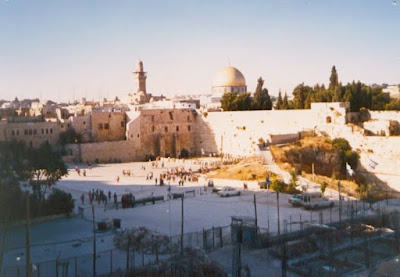Israel Diary, part 8.
Jerusalem is the capital of Israel.
In Judaism, Jerusalem has been the holiest city since, according to the Hebrew Bible, King David of Israel first established it as the capital of the united Kingdom of Israel in c.1000 BCE, and his son Solomon commissioned the building of the First Temple in the city.
You get off at the bus station in Jerusalem and you're on Jaffa Street. Head east on Jaffa and you're on your way to the
Old City. That's about 30 to 40 minutes on foot. There's a brand-new light rail, too, that goes along Jaffa, but I haven't been on it.
From Tel Aviv to Jerusalem is from one country to another; I'm tempted to say another planet. In Tel Aviv, you might have gotten used to advertising posters with pictures of scantily clad women; in Jerusalem, you'll be hard pressed to find pictures of women in any state of attire. That's a symptom of the growing clout of the
haredi (ultra-orthodox) community, and it's been the subject of some controversy lately; more on that later. Men wearing black hats, and women wearing a skirt and a kisuy rosh (head covering) are the rule, not the exception here.
Just before reaching the Old City, I turned off Jaffa Street and followed the directions I'd been given to Salomon Street. It's the site of
Tmol Shilshom, a delightful cafe/restaurant/bookstore run by a friend of a friend named David. The establishment's name derives from the
novel by S. Y. Agnon. If you go to Jerusalem, you need to visit Tmol Shilshom.
David had to divide his time between working and chatting with me, but we had some great conversation. He is originally from Tel Aviv but has been living in Jerusalem for 30 years. I asked him what was on his mind these days; he mentioned Iran. He said, "If we attack Iran, we risk losing the support of the international community." (I refrained from asking, "WHAT support?") He added, "We risk losing the support of the United States."
David also talked about the disappearance of women from public spaces in Jerusalem. It was the left-leaning
Ha'Aretz, he said, that
blew the whistle on this some months ago. No pictures of women on advertising posters, and no female voices on public announcements - this was the new trend in Jerusalem, at the behest of the pious haredim. I do not know exactly where the matter stands now, but it's been in the news and it's an ongoing struggle.
The Old City has seven gates; the one you'll approach from Jaffa Street is the Jaffa Gate. I entered through here.
There's a tourist information office just inside. I thought it would be a good idea to stop in there before going on. I asked for a tourist map in English, and the man at the counter gave me one, but I ended up being happier with my more detailed, Hebrew-language map of Jerusalem that I'd bought from a stationery store in Tel Aviv. I kept the map as a souvenir, though.
I had just one question. "Are there any places I shouldn't go?"
He thought about it for a moment. "No," he said. "No, it's fine." I don't know much about Jerusalem, but I wanted to play it safe.
I took the tour guide's hesitation as an admonition not to push my luck, so I confined my visit to the Jewish Quarter for this trip. I found my way to the Kotel (the Western Wall) and made the obligatory pilgrimage to its smooth, stony surface. I'd visited just twice before - eighteen and 24 years ago.
The Western Wall, Jerusalem, June 1987
After the security checkpoint, there's a couple of people posted to make sure visitors are dressed properly, and, on the men's side, the usual gaggle of men coming and going, prayer congregations in various sizes and stages of completion of the daily prayers, individuals reciting psalms or speaking from the heart, and a whole bunch of tourists just milling about aimlessly.
Over toward the mechitsa (gender divider), though, there seemed to be quite a bit of friendly cross-border communication between the men and the women. The women were praying and singing with great gusto - perhaps pointedly so, as the arrangements for men's and women's services at the Wall have been the subject of a great deal of contention. There is an organized movement for
women praying at the Western Wall. From where I stood (and I didn't get close to the group, so I don't know for sure) it appeared that the men in this group were generally sympathetic to the women's right to pray expressively. At any rate, there was a great deal of audible singing and chanting from the women's side, and much conversation across the divider.
I spent a good two hours just wandering the streets of the
Jewish Quarter. The Old City is like Borges' Aleph: small on the outside, but of nearly infinite size inside. But the streets are narrow like a labyrinth: it occurred to me that notwithstanding my earlier misgivings, the greatest peril to life and limb in the Old City is probably the danger of being crushed against the side of a building by a motor vehicle.
The 1948 Defenders' Plaza is spacious and lovely; down an adjoining alley, there is a memorial to those who lost their lives defending the Jewish Quarter in that war, in which all of the Quarter's 2000 Jewish inhabitants were evicted or killed. Our side took it back in 1967.
1948 Defenders' Square. (The year 1948 is represented as "Tashach" in Hebrew.)
As I sat on a bench on the Plaza, a bar mitzvah celebration came slowly winding into view. There were musicians blowing horns and banging drums, dressed in white, and, but for their long sidelocks, looking for all the world like Hare Krishnas. The boy seemed to be having the time of his life.
























